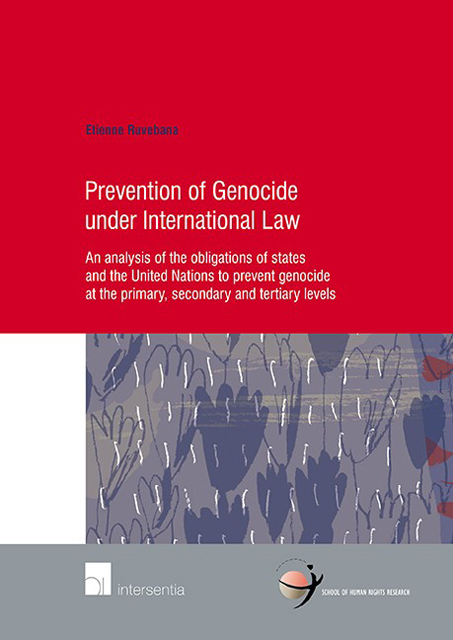 Prevention of Genocide Under International Law
Prevention of Genocide Under International Law Book contents
- Frontmatter
- Acknowledgements
- Contents
- List of Abbreviations
- Chapter I General Introduction
- Chapter II The Concept of Prevention as Understood in various Fields
- Chapter III The Concept of Prevention in the Field of Genocide in General
- Chapter IV Prevention of Genocide Under International Law
- Chapter V The Obligation of Territorial States to Prevent Genocide Under International Law
- Chapter VI Prevention of Genocide by Non-Territorial States Under International Law
- Chapter VII The United Nations and the Obligation to Prevent Genocide Under International Law
- Chapter VIII Prevention of Genocide and the Concept of the Responsibility to Protect
- Chapter IX Summary and General Conclusions
- Bibliography
- Samenvatting
- Curriculum Vitae
- School of Human Rights Research Series
Chapter II - The Concept of Prevention as Understood in various Fields
Published online by Cambridge University Press: 24 November 2022
- Frontmatter
- Acknowledgements
- Contents
- List of Abbreviations
- Chapter I General Introduction
- Chapter II The Concept of Prevention as Understood in various Fields
- Chapter III The Concept of Prevention in the Field of Genocide in General
- Chapter IV Prevention of Genocide Under International Law
- Chapter V The Obligation of Territorial States to Prevent Genocide Under International Law
- Chapter VI Prevention of Genocide by Non-Territorial States Under International Law
- Chapter VII The United Nations and the Obligation to Prevent Genocide Under International Law
- Chapter VIII Prevention of Genocide and the Concept of the Responsibility to Protect
- Chapter IX Summary and General Conclusions
- Bibliography
- Samenvatting
- Curriculum Vitae
- School of Human Rights Research Series
Summary
INTRODUCTION
Law as a discipline is not a closed vehicle of ideas and thoughts. It is conceived and written in connection with other disciplines. This means that it cannot stand alone and it therefore needs other disciplines for not only its formulation and understanding but also its certainty. As simple example, law does not have its own language and the rules are formulated in different languages which are also used in other disciplines and one needs to know what the terms used mean from their ordinary or contextual meaning to understand their scope.
In this respect, before seeking to understand what prevention of genocide means in international law, this chapter explains that concept of prevention from different fields. Indeed, the understanding of the meaning of the concept of prevention and actions to be taken as well as the time to take them will help to understand what the prevention of genocide might entail and when actions are needed and can be taken. Thus, the understanding of this concept from other fields will be useful to the thinking or conceptualization of prevention of genocide. In other words, drawing from this chapter will help to understand and clarify what the prevention of genocide may entail or what it ought to entail. It should be understood however that the aim of this chapter is not to develop all fields that use prevention but rather to provide some examples that help to understand the meaning and the scope of the concept of prevention in order to see how far these theories can shape the methods and techniques useful for the prevention of genocide. This chapter will be limited to five different fields which are prevention in public health, prevention of the proliferation of nuclear weapons, prevention in criminology, prevention in international environmental law and the prevention of torture. The choice of these five fields is mainly dictated by the relatively frequent use of prevention and the development of that concept as it will be demonstrated in each of them.
PREVENTION IN PUBLIC HEALTH
It is believed that the concept of prevention was first developed in the field of public health.
- Type
- Chapter
- Information
- Prevention of Genocide Under International LawAn Analysis of the Obligations of States and the United Nations to Prevent Genocide at the Primary, Secondary and Tertiary Levels, pp. 11 - 46Publisher: IntersentiaPrint publication year: 2014


